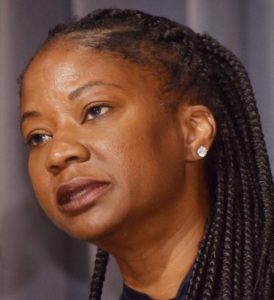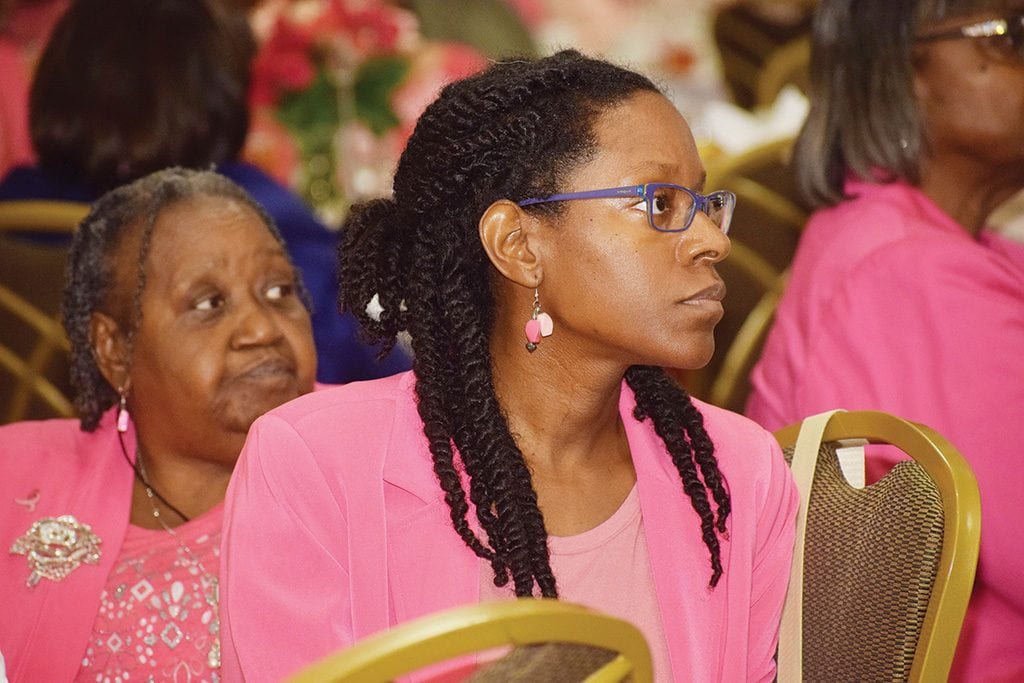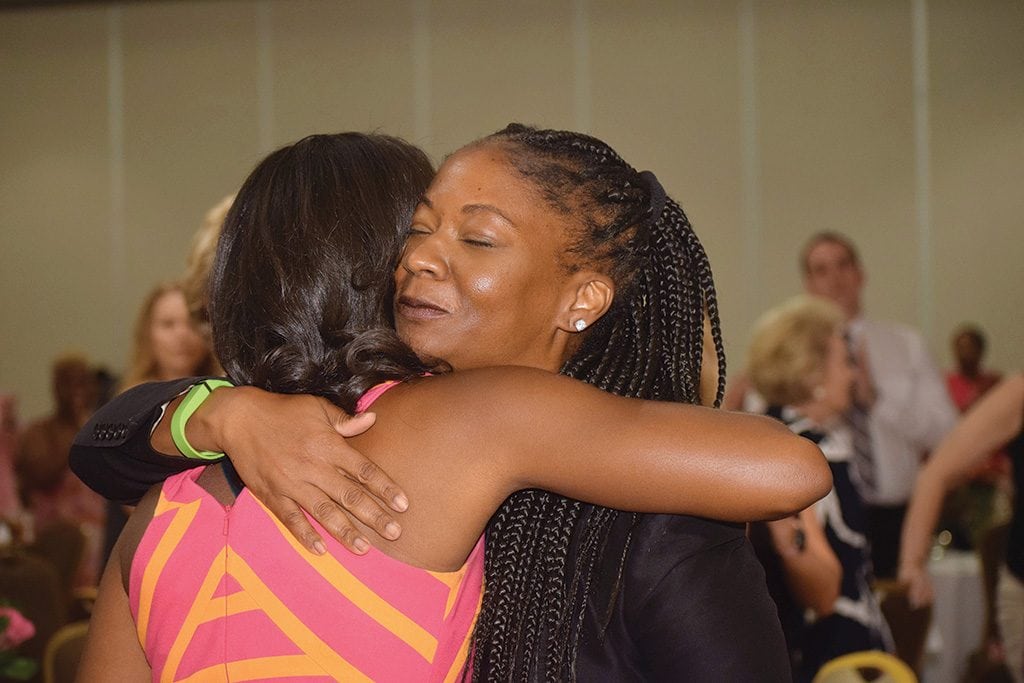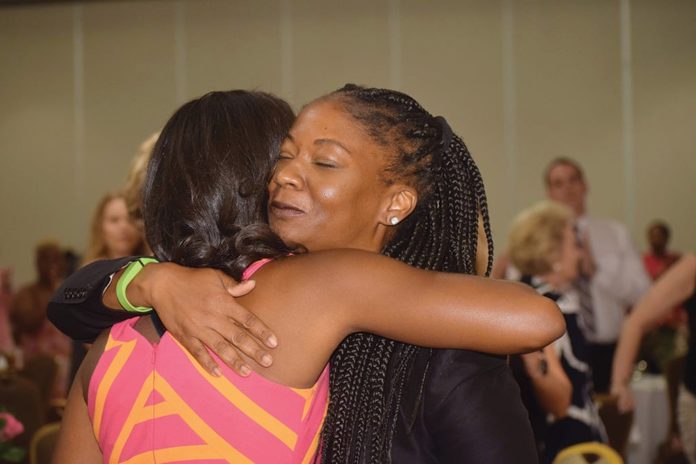
Susan G. Komen Memphis-MidSouth Mississippi Survivor & Those Living with MBC Luncheon. (Photo: Karanja A. Ajanaku)
It would be difficult – no, impossible – to overstate how humbly and effectively Dr. Lori Wilson delivered what essentially was the keynote address during a gathering at the Holiday Inn-University of Memphis last Saturday afternoon.
“I am a breast cancer survivor. I work through my fear,” said Wilson, associate professor of surgery and division chief of Surgical Oncology at Howard University Hospital and College of Medicine.
That disclosure partly was a reference to speaking to an esteemed audience such as the one that constituted the 2018 Susan G. Komen Memphis-MidSouth Mississippi Survivor & Those Living with MBC Luncheon.
She need not have been apprehensive. The tears that rolled down cheeks as she spoke and the hugs that engulfed her afterwards was proof plenty that she got her points across; and the main point had to do with equity.
“My goal has always been to focus on making sure that everyone has a fair and just opportunity …removing all the barriers that makes outcomes different. Whether those disadvantages are social, economic are environmental.”
That focus has shaped who she is, her perspective, voice and advocacy.
“As a black woman who is a breast cancer survivor, it is not lost (on) me that we are dying unnecessarily to breast cancer at a rate that is more than 40 percent higher than white women,” she said.

“In Memphis, black women die from breast cancer 74 percent of the time more than white women. That has got to mean something. …”
Wilson envisions “focused action, bringing our many voices together for solutions to improve public policy, for resource allocation for the benefit of closing the gap in cancer care.
“We must feel empowered to walk away from today and work together to affect change; to enhance the benefits of scientific advancement; to improve health literacy, to have clinical research participation really just soar.”
Such a collective approach must be rooted in prevention, access to care and new and relevant treatment that will impact health equity, she said.
Komen has invested in 10 target cities, including Memphis, to reduce breast cancer deaths by 50 percent in the U.S. by 2026.
“That means something,” Wilson said.
Born in the Southeastern region of Virginia, Wilson is the first in her family to go to college, the first to go to graduate school, the first with a degree that provides the opportunity to care for patients.
The facts of cancer – and of health care inequity – are etched in her mind, including that over 250,000 women in the United States will be diagnosed with breast cancer this year.
“Nearly 32,000 women who look like me will be diagnosed. …And when they are diagnosed before the age of 50 like I was, it is more likely to be more aggressive and have fewer ways to treat,” she said.
There is so much more work to be done relative to understanding breast cancer, she said, noting that is why organizations such as Susan G. Komen are so extraordinarily important.
For Wilson, here is the big question: “How do we elevate the conversation to achieve health equity?”
She practices in Washington, DC, which has the highest incidence of breast cancer in the nation and one of the highest mortality rates.
As the division chief of surgical oncology, she is one of the few African-American women in the country to hold such a post. She serves a diaspora of patients that look like her.
“I spend my day partnering with women to help them understand the word cancer that has now become their diagnosis. What that diagnosis really means, what the treatment will do and how they will look toward their future in a real and relevant way.”
Her patient population comes from Wards 7 and 8 in DC.
“The average median income for those patients is about $24,000. The average income in Washington, DC is $101,000. There is a big disparity going on in the city.”
There are things that need to change and be made better, she said.
“I am able to make differences through grant funding …I able to shine light on the causes for health disparity. But what statistics tell me is that we must do more. …
“Black women are more disproportionately affected by breast cancer and our mortality rates are worse. What we are doing is not enough.”
On June 28, 2013 at 2:20 p.m., Wilson was diagnosed with breast cancer. Her cancer journey was shared in a Ken Burns documentary, where, along with others, there was talk of the good – and not so good – moments.
“For me it was important to leave something … (for) … my son, just in case. We did it (the documentary) earnestly, trusting that it would resonate. And it did resonate.”
By self-description, Wilson is a wife, a mother, a daughter, a sister, a friend “and most importantly a woman of God.” Her diagnosis was breast cancer in both breasts. Then came 16 treatments of chemotherapy followed by a double mastectomy with immediate reconstruction, 30 treatments of radiation to her chest wall and hormonal therapy.

The most challenging part of the cancer battle for her was after the treatment ended.
“What I realized as a surgeon and a survivor was that there is still so much that we don’t know,” she said. “For me, it was a call to arms. …
“What we know is that quality access to breast cancer care is essential. It decreases but does not eliminate the disparities that we see in breast cancer outcomes. This tells me as a believer in evidence-based medicine that we must do more.”
That involves thinking outside of current paradigms and providing innovative ways of thinking about the challenges of breast cancer, she said.
“I ask one thing of everyone in this room, and that is to join the call to arms and let your unique voices be heard.”




